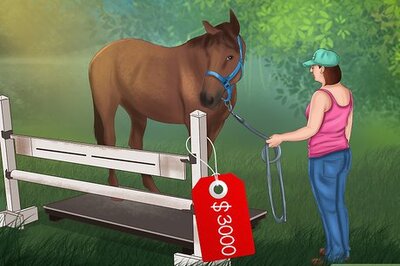
views
Today’s Big StoriesIndia decides to not join world's largest free trade agreement RCEP, says can't compromise core interests
Indian government has decided to not join the Regional Comprehensive Economic Partnership (RCEP), which would have been the world’s largest trade pact, over concerns that it could lead to a potential flood of Chinese imports in the country. Prime Minister Narendra Modi said that the agreement did not reflect its original intent, and that its outcome wasn't fair or balanced. The government has decided to put the interests of farmers and small businesses above that of free trade. But then, the government knew this all along. Why walk out after seven years of bipartisan talks? Zakka Jacob writes that’s because the real reason to pull out of RCEP may be political and not an economic or diplomatic one.Race to meet high command, state governor as no finishing line in sight for Maharashtra govt formation
NCP chief Sharad Pawar on Monday met Congress president Sonia Gandhi after which he asserted that the responsibility to form the government there is with the BJP and its allies, but kept the guessing game on with a "can't say what will happen" in the future remark. Meanwhile, Shiv Sena leader Sanjay Raut met Maharashtra governor Bhagat Singh Koshyari amid the political stalemate, but described his meeting as a "courtesy call". “Whoever enjoys majority should be allowed to form the government," Raut maintained. Meanwhile, state CM Devendra Fadnavis also met Amit Shah at his New Delhi residence following which he emphasized that "there is a need to form government in Maharashtra at the earliest."In Other NewsCracking the whip: Terming the pollution in national capital as 'atrocious', the Supreme Court on Monday said that people are not safe even inside their house. The top court ordered an immediate and complete stop to stubble burning by farmers in Punjab, Haryana and Uttar Pradesh, blamed for 46 per cent of the pollution.Attack in aftermath: Militants lobbed a grenade in a busy market in the heart of the Jammu and Kashmir’s Srinagar on, killing one person and injuring over 40 on Monday, almost three months since the Valley shut down in response to the Centre abrogating Article 370.Deadline approaching: With the November 5 deadline approaching, the Telangana government on Monday once again reiterated its stand that the striking employees who fail to report to duty by tonight will loose their jobs. In the case, the government would grant permits to private operators for 5,000 routes, in addition to the already-decided 5,100 routes.In hiding: Greek police found 41 migrants, mostly Afghans, hiding in a refrigerated truck at a motorway in northern Greece on Monday. The migrants were not injured, one of the officials said, adding that the refrigeration system had not been turned on.Lawyers protest: Advocates in the Delhi High Court and all district courts here on Monday abstained from judicial work protesting against the clash between lawyers and police in the Tis Hazari court complex on Saturday.On Our SpecialsGas chamber: Delhi has turned into a gas chamber, and not for the first time. Delhi Chief Minister Arvind Kejriwal, who initially was using public funds taking credit for ‘clean air’ in the national capital, is now blaming the CMs of neighbouring states. Delhi turning into a gas chamber at least twice a year, given the two cropping seasons, is a reflection on governance deficit. This deficit is not just attributable to the present Delhi government or the Narendra Modi government at the Centre, but to almost all governments of the past in Delhi or at Raisina Hills. Sidharth Mishra explains why the answer to Delhi's pollution woes lies in 1980's, not in stubble burning.Space spectacle: We've all known about Laika the space dog, the Russian mongrel that, unbeknownst to herself, created an irreplacable history by becoming the first living creature to orbit the Earth, exactly 62 years ago. The myth and life of one of the world's most favourite dogs of all time have endured, but for many, the truth behind Laika's space mission largely remained unknown until 1998, when cosmonauts finally admitted the truth. Contrary to what the Soviet Union had maintained for years as pressure from the media and activist groups began to mount, Laika the space dog had not survived in space for seven days. Shouvik Das remembers the story of Laika, the space dog. On Reel
Curated and compiled by Karan Anand

















Comments
0 comment